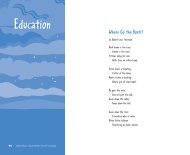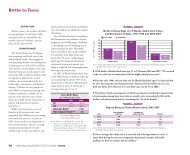2010 Rhode Island Kids Count Factbook
2010 Rhode Island Kids Count Factbook
2010 Rhode Island Kids Count Factbook
You also want an ePaper? Increase the reach of your titles
YUMPU automatically turns print PDFs into web optimized ePapers that Google loves.
Math Skills<br />
DEFINITION<br />
Math skills is the percentage of<br />
fourth- and eighth-grade students who<br />
scored at or above the proficiency level<br />
for math on the New England Common<br />
Assessment Program (NECAP) test.<br />
SIGNIFICANCE<br />
The ability to understand and use<br />
mathematics is critical in life. Students<br />
must rely on math skills not only for<br />
advancing their education, but also in<br />
the course of daily activities. 1 Strong<br />
high school math skills can also open up<br />
higher education and career opportunities<br />
for students. 2 Schools in <strong>Rhode</strong> <strong>Island</strong><br />
teach mathematics every year through<br />
eighth grade and require students to<br />
take four years of mathematics to<br />
graduate from high school. 3,4<br />
State, national and international<br />
assessments show that U.S. students<br />
fare well when asked to perform<br />
straightforward computational procedures,<br />
but tend to have a limited understanding<br />
of the basic mathematical concepts needed<br />
to solve simple problems. Performance in<br />
mathematics, while generally low, has<br />
been improving over the past decade. 5<br />
Family risk factors, such as poverty,<br />
language barriers and low maternal<br />
education levels are associated with low<br />
student achievement in mathematics. 6<br />
Disparities in math achievement related<br />
to race and family income persist in the<br />
United States. 7 Students with<br />
100<br />
90<br />
80<br />
70<br />
60<br />
50<br />
40<br />
insufficient math skills will have fewer<br />
30<br />
20<br />
opportunities to pursue post-secondary<br />
10<br />
4th Grade and 8th Grade Math Proficiency Levels by<br />
education and secure high-level<br />
Student 0 Subgroup, <strong>Rhode</strong> <strong>Island</strong> Public Schools, October 2009<br />
2007 and 2009 NAEP math tests. 13,14<br />
employment than their peers. 8<br />
Frequent engagement in classroom<br />
4th Grade Students 8th Grade Students<br />
activities, such as doing math problems 100%<br />
90%<br />
from a textbook, talking with others<br />
80%<br />
about how to solve math problems and<br />
70%<br />
76%<br />
75%<br />
using a calculator are associated with<br />
60%<br />
68%<br />
62%<br />
higher scores on assessments, particularly<br />
50% 54%<br />
71% 64%<br />
61%<br />
for older students. 9 40%<br />
46%<br />
Students’ achievement<br />
39% 40% 39%<br />
30%<br />
35%<br />
37%<br />
in math is highest when they are taught<br />
30% 30%<br />
20%<br />
24%<br />
by teachers with strong backgrounds<br />
10%<br />
18%<br />
15%<br />
9%<br />
and training in teaching math. 10<br />
0%<br />
All English Students Low- Higher- White Asian Black Hispanic Native<br />
Achieving math proficiency for all<br />
Students Language with Income Income<br />
American<br />
Learners Disabilities Students Students<br />
students requires that improvements be<br />
made in curriculum, instructional<br />
Source: <strong>Rhode</strong> <strong>Island</strong> Department of Elementary and Secondary Education, New England Common Assessment Program<br />
100%<br />
(NECAP), October 2009.<br />
materials, assessments, classroom<br />
90%<br />
practice, teacher preparation and<br />
◆ In 80% October 2009, 62% of <strong>Rhode</strong> <strong>Island</strong> fourth graders 76% scored at or above proficiency in<br />
professional development. 11,12<br />
68%<br />
math, compared to 54% of eighth graders. 15,16 68%<br />
Nationally and 75%<br />
70%<br />
62% 62% 62%<br />
62%<br />
64% in <strong>Rhode</strong> 61% <strong>Island</strong>, there are<br />
60%<br />
54% 54% 55%<br />
The National Assessment of<br />
math 50% achievement gaps between subgroups of<br />
46%<br />
elementary and middle school students.<br />
39% 40%<br />
Educational Progress (NAEP) measures<br />
40%<br />
39%<br />
35%<br />
37%<br />
30% 30%<br />
proficiency in math nationally and ◆ Fourth-and 30% eighth-grade students 24% who are English Language Learners (ELL) and<br />
20%<br />
18%<br />
15%<br />
across states. In 2009, 81% of <strong>Rhode</strong> students with disabilities were the least proficient in math in <strong>Rhode</strong> <strong>Island</strong>. In 2009 in<br />
10%<br />
9%<br />
<strong>Island</strong> fourth-graders performed at or <strong>Rhode</strong> 0% <strong>Island</strong>, only 18% of fourth-grade and 9% of eighth-grade ELL students scored at or<br />
above the Basic level in math on NAEP,<br />
compared with 82% nationally. Sixtyeight<br />
above proficiency. Twenty-four percent of fourth-grade and 15% percent of eighth-grade<br />
students with disabilities were proficient in math in 2009. 17<br />
percent of <strong>Rhode</strong> <strong>Island</strong> eighth-<br />
graders performed at or above the Basic<br />
level in math on the NAEP, compared<br />
with 73% nationally. <strong>Rhode</strong> <strong>Island</strong> was<br />
one of only four states in which the<br />
performance of both fourth- and<br />
◆ Nationally and in <strong>Rhode</strong> <strong>Island</strong>, the achievement gap between girls and boys in math has<br />
been virtually eliminated at the elementary and middle school levels. In <strong>Rhode</strong> <strong>Island</strong> in<br />
2009, 62% of male and female fourth-grade students scored at or above proficiency in<br />
math, and 55% percent of male and 54% of female eighth-grade students scored at or<br />
above proficiency in math. 18,19<br />
eighth-graders improved between the<br />
All<br />
Students<br />
Females<br />
Males<br />
English Language<br />
Learners<br />
Students with<br />
Disabilities<br />
Students without<br />
Disabilities<br />
Low-Income<br />
Students<br />
Higher-Income<br />
Students<br />
White<br />
Asian<br />
Black<br />
Hispanic<br />
Native<br />
American<br />
140 <strong>2010</strong> <strong>Rhode</strong> <strong>Island</strong> KIDS COUNT <strong>Factbook</strong> / Education






